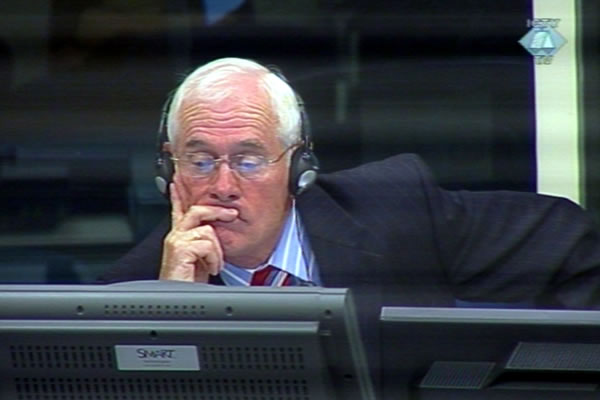Home
LORD CARRINGTON’S VAIN HOPES
Irish colonel Colm Doyle described at the trial of Ratko Mladic his meeting with Slobodan Milosevic in Belgrade 1992. At that time, the Serb troops were shelling Sarajevo mercilessly. Doyle’s chief, Lord Carrington, ‘waited impatiently’ for Milosevic to wield his influence over General Mladic and make him stop the shelling of Sarajevo. This never happened
 Colm Doyle, witness at the Ratko Mladic trial
Colm Doyle, witness at the Ratko Mladic trial Irish colonel Colm Doyle started his evidence at the trial of Ratko Mladic today. Doyle served as the chief of the European Community Monitoring Mission in BH and personal envoy of Lord Carrington, chairman of the International Conference for the former Yugoslavia. In October and November 1991, Doyle was stationed in Banja Luka and was then transferred to Sarajevo where he stayed until 12 May 1992 when he was evacuated.
In the statement that was admitted into evidence, Doyle spoke in detail about the growing tensions in the municipalities along the border with Croatia in the fall of 1991 and in Sarajevo before the independence referendum on 19 February and 1 March 1992. Doyle also spoke about the shelling of Sarajevo in May 1991. The tales of ‘Chetniks’ and ‘Ustashas’ started circulating among the people, and the topic of the crimes committed in World War II gained prominence. At the same time, the number of armed Serb reserve soldiers grew, causing the Muslim and Croats to feel unsafe.
When a JNA helicopter evacuated Doyle from Ilidza to Pale in May 1992, he saw a large number of artillery weapons, large-caliber mortars and tanks on the hills around Sarajevo on positions controlled by the Serb troops. In the examination-in chief, Doyle said it was the JNA weaponry that had been handed over to the Serb reserve troops, called up in 1991. At the same time, Croats and Muslims dodged the draft and ended up weaponless.
As Doyle recounted, at the beginning of the conflict in Sarajevo the staff in his hotel in Ilidza suddenly changed: the ethnic Muslims were gone. The Serb representatives explained to Doyle that Muslims had been transferred to the center of Sarajevo. The only Muslim still working in the hotel was the chef, Doyle was told, because he ‘was an excellent cook’. At a meeting in Pale on 1 May 1992, Biljana Plavsic told Doyle that Serbs in BH should get at least 75 percent of the territory, Doyle said.
As the chief of the European Community Monitoring Mission and Lord Carrington’s personal assistant, Doyle often met with the representatives of the warring sides. He met Slobodan Milosevic in Belgrade on one occasion. Lord Carrington ‘was waiting impatiently’ for Milosevic to wield his influence over General Mladic and make him stop the shelling of Sarajevo. Milosevic condemned the shelling of Sarajevo but the shells continued falling until the end of the conflict in BH in late 1995. In the meantime, Western media nicknamed Mladic ‘the scourge of Sarajevo’.
In the first part of the cross-examination, Mladic’s defense counsel Dragan Ivetic insisted that ‘everyone’ who responded to the 1991 call-up had been issued a weapon. People from the international community ignored the fact that the decision to call the referendum was legally invalid and the fact that the Muslim side ‘was getting ready for a war, not peace’ in late 1991, Ivetic said.
Ivetic also brought up a statement by Sefer Halilovic, in which the first war commander of the BH Army says that as early as on 2 December 1991 he had presented a defense plan to Izetbegovic and other Muslim leaders. After that, nine regional and 98 municipal commands of the Patriot League were established. In March 1991, the Patriot League had about 80,000 personnel under arms. The defense will continue cross-examining Colm Doyle tomorrow.
Linked Reports
- Case : Mladic
- 2012-08-22 MLADIC CAUTIONED FOR INSULTING WITNESS AND MAKING LOUD COMMENTS IN COURT
- 2012-08-21 ‘SCOURGE OF SARAJEVO’ CONTROLLED PRESSURE IN CITY
- 2012-07-20 MLADIC MAKES OFFENSIVE REMARKS ABOUT SREBRENICA VICTIMS
- 2012-08-24 MLADIC APOLOGIZES
- 2012-08-27 MLADIC WANTED TO ‘ROLL OUT THE MINDS’ OF THE PEOPLE IN SARAJEVO
- 2012-08-28 ‘ARSONISM’ IN SARAJEVO
